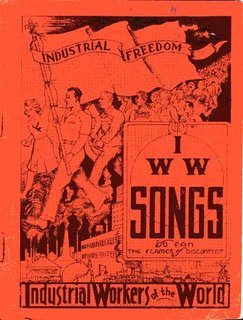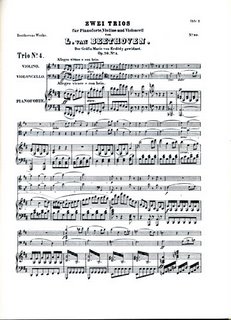"Hallelujah, I'm a Bum!"

The "Wobbly" or IWW (Industrial Workers of the World) Little Red Songbook has been through over forty editions since 1909 and is nearly universally recognized, at least among Americans of a certain age, wobbly or leftist or not, perhaps rivalling Ginsberg's Howl as the most backpack-able of rebel screeds. Some might argue that the Little Red Songbook has been the most widely-dispersed and longest-lasting achievement of the wobblies.
The official title is Songs of the Workers: To Fan the Flames of Discontent. Classics here include The Preacher and the Slave ("Long-haired preachers come out every night..."), Union Maid, Mr.Block, Dump the Bosses Off Your Back, Hallelujah, I'm a Bum!, There is Power in a Union, and of course, The International. Many were written by Joe Hill, the wobbly organizer executed in Utah in 1915.
To hear some of these sung, head to Fogler's Media Resource Center and ask for Don't Mourn -- Organize! or The Legends of Folk. Or go to Don't Mourn -- Organize! at Smithsonian Folkways for samples of several wobbly songs. Or go to the U. Utah Phillips' site, and go to the "Tapes and CDs page here. Scroll down to the CD "We Have Fed You All A Thousand Years" and click on the individual links to hear a number of the songs mentioned above. On Don't Mourn, Organize! Hazel Dickens does a chilling version of The Rebel Girl.
The Wobbly Songbook may have taken the idea of its basic format from nineteenth century hymnals. The essence here is portability, a small book that travels well, either in a pocket or a purse.
Shown here is a two-page spread from Hymns for the Use of the Methodist Episcopal Church, revised edition, 1852. The "Address" (preface) in front closes thus: "We exhort you, dear brethren, to sing with the spirit, and with the understanding also; and we shall rejoice to join you in time and in eternity."
There is no music reproduced here, only song texts. We presume that the leader of the singing, or the accompanist, or both, would set the tune, or that many congregants knew the tunes by heart.
Our last example of small follow-along music books is a miniature score (known also as a "study score," sometimes as a "pocket score"). This genre, according to the Oxford Companion to Music, arose in the late 19th century "to meet the demand created by the rise in popularity of public concerts and, later, recordings." They allow concert-goers to follow along as the program unfolds, though this practice appears to be fading. I remember attending performances by the Juilliard Quartet at Chicago's Orchestra Hall in Chicago in the late 70s and, across the hall, seeing multiple attendees reading their miniatures.
Reproduced here is the opening page of Beethoven's Trio No. 4, Opus 70, No. 1.
Another use of miniature scores is as a tool for students, giving access to the full (conductor's) score at a fraction of the price.
Fogler Resources
Fogler's Media Resource Center holds thousands of CDs from many genres. All recordings owned by Fogler are represented in URSUS and searchable by title and performer. In addition, the staff in this area are very knowledgeable about our holdings.
In URSUS, subject search terms such as hymns, songbooks, community music, and working class--songs and music lead to books similar to those displayed and discussed here.
The Special Collections Department holds a box of materials on the IWW (record here).
Miniature scores held in Fogler are shelved together at the end of the "M" call numbers, just before the "Folio M's" and the beginning of "N."
On the Web
The Digital Tradition/Mudcat Cafe is an enormous database of folk lyrics and music, as is The Traditional Ballad Index. History in Song focuses on topical songs of the twentieth century.
The wobblies live on at iww.org. They're temporarily out of stock of The Little Red Song Book; you can buy a reprint of the 1923 edition -- from the year of peak IWW membership -- here at Amazon.com.
Utah Phillips is the best-known of of any present-day wobbly. Other active artists known for their renditions of wobbly songs (and working in the same tradition) include Billy Bragg, Si Kahn, and Hazel Dickens (Wikipedia entry).

No comments:
Post a Comment